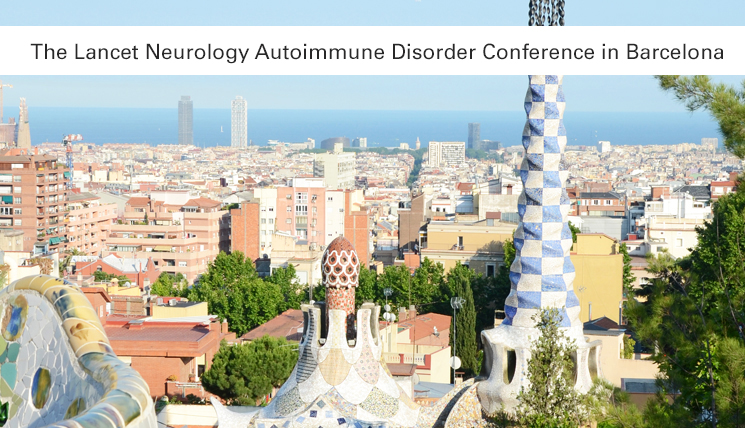Experts from different countries gathered at the international Lancet Neurology Autoimmune Disorder Conference on 26th and 27th March in Barcelona to discuss the latest findings in research on neuronal autoimmunity and target antigens in CNS. EUROIMMUN was one of the major sponsors of the conference. N-methyl-D-aspartate receptor (NMDAR), an important molecule for the synaptic impulse transmission in the brain was the main topic of discussion. In 2007, Dr. Josep Dalmau, investigator of the University of Barcelona and Adjunct Professor of Neurology, University of Pennsylvania, described a close connection between autoantibodies against NMDAR and a special form of encephalitis in 12 patients, which was consequently given the name anti-NMDAR encephalitis [1].
In the last eight years a large number of scientific publications have dealt with cases of this disease which were sometimes only identified retrospectively. This contributed to a relatively well defined clinical picture [2, 3, 4]: in the early phase of anti-NMDAR encephalitis, symptoms are often general, such as fever, headache or back aches. Later, there are psychiatric signs, from mood swings and increased anxiety to hallucinations and severe behavioural disorders. In the following phase, patients do no longer react to external stimuli or direct address, seem apathetic and remain in a rigid posture. In many cases patients suffer from epileptic seizures or movement disorders (dyskinesia), such as involuntary movements of the limbs or cramping of the jaws. In the phase of “autonomous instability”, arrhythmia, fluctuation of blood pressure and body temperature and hypoventilation occur. In approximately 50 to 60% of cases, the encephalitis appears in parallel with a tumour (paraneoplasia, in women, frequently ovarian tumours). In most of the diagnosed cases, patients surprisingly recover very soon after corresponding therapy. Immune system suppression and removal of the tumour, if necessary, are considered the most important treatment. If however the disease remains untreated, it may lead to severe secondary damage or death.
The psychiatric symptoms make it difficult to diagnose this form of encephalitis, despite increasing knowledge and awareness about the disease [1]. Many patients are referred to psychiatric treatment due to suspected psychoses. Also the conventional tests and investigations for encephalitis like magnetic resonance tomography (MRT) frequently do not provide secure evidence of the disease. The helpful diagnosis “anti-NMDAR encephalitis” is achieved by the specific detection of anti-NMDAR autoantibodies (directed against the extracellular domain of subunit NR1 [4]) in blood serum and cerebrospinal fluid of the patients [2]. Indirect immunofluorescence tests (IIFT) are considered an especially sensitive detection method. Neuronal tissue (rat hippocampus, cerebellum) and transfected cells (HEK293) expressing NMDAR (NR1/NR2 subunits) [2, 3, 4, 5] are used as substrates. Anti-NMDAR IIFT standardised in this way are available for diagnostics (EUROIMMUN IIFT Mosaics for neurology) [5].
Internationally renowned scientists and physicians from the field of neuronal autoimmune diseases participated as speakers in the conference. They included Josep Dalmau (first description of anti-NMDAR encephalitis; University of Pennsylvania, USA and University of Barcelona, Spain), Francesc Graus (University of Barcelona, Spain) and Vanda Lennon (Mayo Clinic College of Medicine, Rochester, USA).
As a special guest, Susannah Cahalan contributed as a speaker. After suffering from severe hallucinations, paranoia and seizures for several weeks and a multitude of unsuccessful investigations, specialist Souhel Najjar diagnosed her with the disease. Already some weeks after the diagnosis, Susannah Cahalan could leave the hospital. 2012, she published a book (“Brain on Fire”) where she relates about the time of her illness, reconstructed from her own few memories and the records of her doctors and her father. Nowadays, she gives lectures in hospitals and universities.
Information on services to people affected by encephalitis can be obtained from e.g. The Encephalitis Society and the Autoimmune Encephalitis Society.
[1] Dalmau et al., Ann Neurol. 2007, 61(1): 25–36. [2] Prüß et al., Nervenarzt 2010. [3] Peery et al., Autoimmun Rev 2012, 11: 863-872. [4] Dalmau et al., Lancet Neurol 2008. [5] Wandinger et al., J Neuroimmunol 2011, 231: 86-91.

